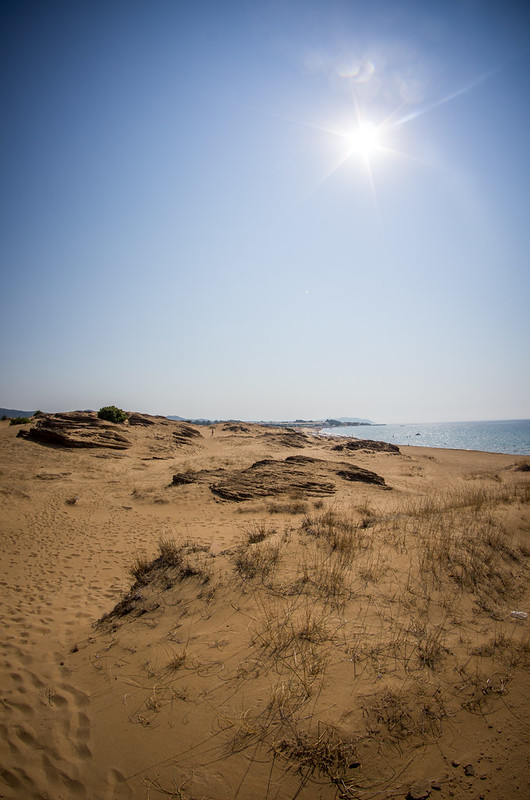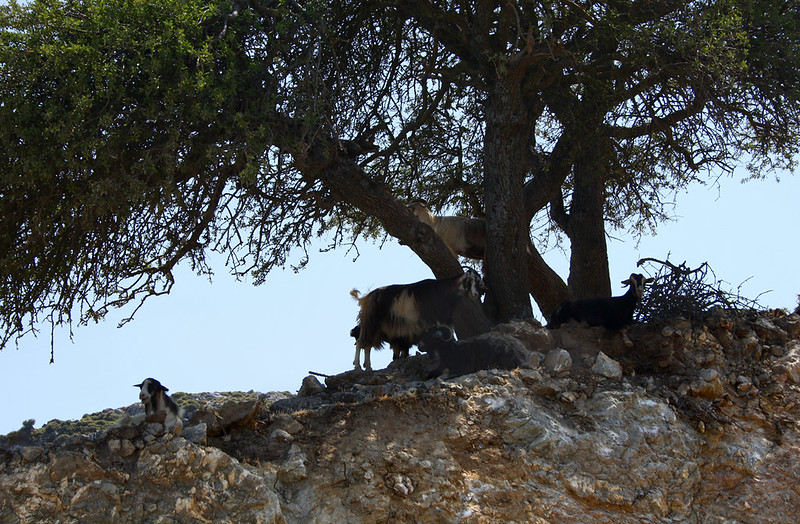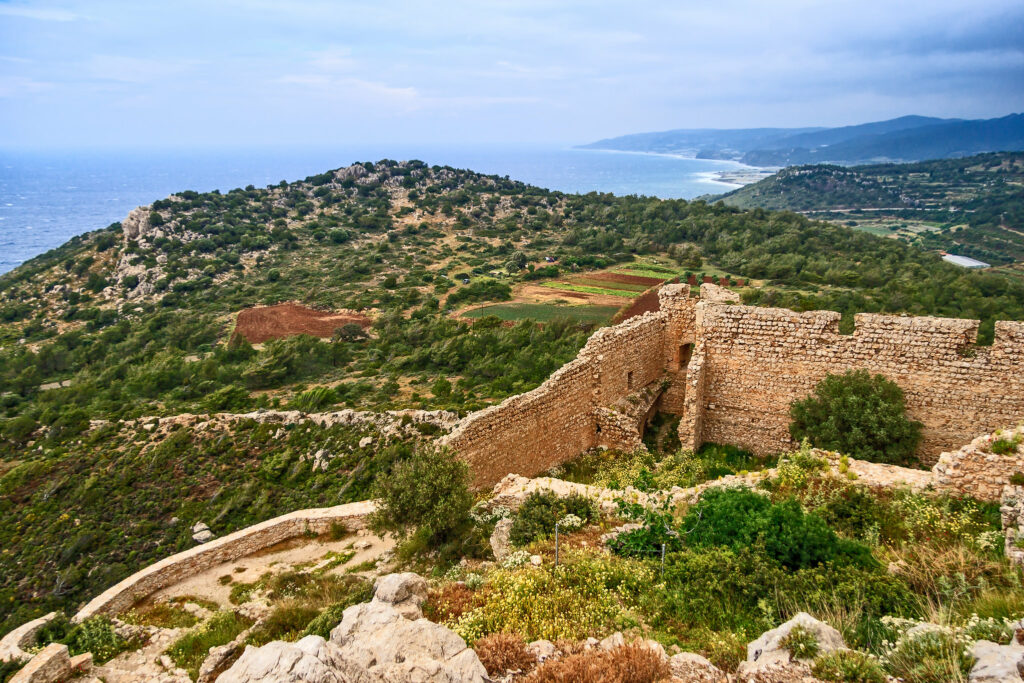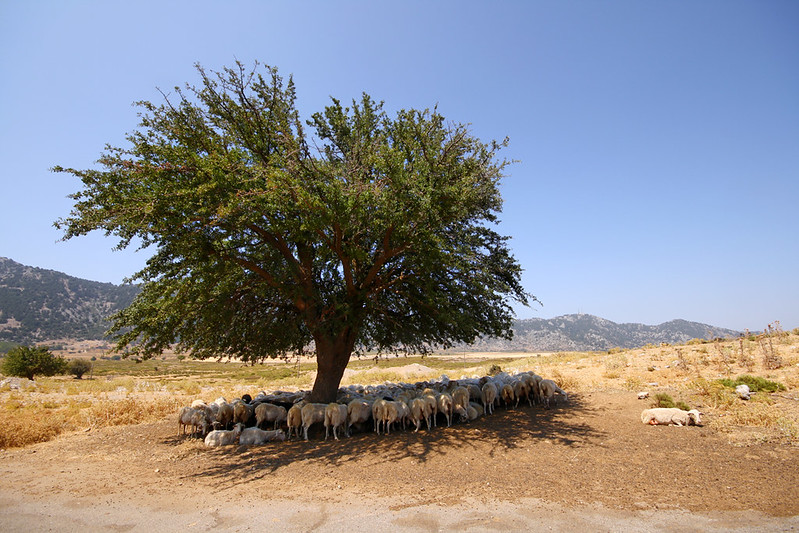It’s summer in the northern hemisphere, and for many regions there have been severe heatwaves. Even the Acropolis in Athens had to be closed to visitors in the hottest part of the day. And with the wildfires raging in many places we hope everyone is staying safe.
So we wondered what we could find in the ancient Greek texts about summer.
The ancient Greeks tried to explain the seasons; for example:
Chapter VIII. OF WINTER AND SUMMER.
Empedocles and the Stoics believe that winter is caused by the thickness of the air prevailing and mounting upwards; and summer [thereios] by fire [pûr], it falling downwards.Pseudo-Plutarch, Placita Philosophorum 3.8, adapted from translation by William Goodwin
Hippocrates in his work on Epidemics (De morbis popularibus) — which are case studies of different epidemics — describes the symptoms of diseases and how they came on during the summer:
Beginning early in the summer [theros], throughout the summer [theros] and in winter many of those who had been ailing a long time took to their beds in a state of consumption, while many also who had hitherto been doubtful sufferers at this time showed undoubted symptoms. Some showed the symptoms now for the first time ; these were those whose constitution inclined to be consumptive. Many, in fact most of these, died ; of those who took to their beds I do not know one who survived even for a short time. Death came more promptly than is usual in consumption…
…
But when summer [theros] came, and during autumn occurred many continuous but not violent fevers, which attacked persons who were long ailing without suffering distress in any other particular mannerHippocrates De morbis popularibus 1.1, from Parts 2 and 3, adapted from translation by W.H.S. Jones
Diodorus Siculus also describes how the heat of summer exacerbated symptoms of the Athenian plague:
As a result of heavy rains in the previous winter the ground had become soaked with water, and many low-lying regions, having received a vast amount of water, turned into shallow pools and held stagnant water, very much as marshy regions do; and when these waters became warm [thermaínein] in the summer [theros] and grew putrid, thick foul vapours were formed, which, rising up in fumes, corrupted the surrounding air, the very thing which may be seen taking place in marshy grounds which are by nature pestilential. [4] Contributing also to the disease was the bad character of the food available; for the crops which were raised that year were altogether watery and their natural quality was corrupted. And a third cause [aitia] of the disease proved to be the failure of the etesian winds to blow [pneîn], by which normally most of the heat [kaûma] in summer [theros] is cooled [psukhein]; and when the heat [thermasia] intensified and the air grew fiery [empuros], the bodies of the inhabitants, being without anything to cool [psûxis] them, wasted away. [5] Consequently all the illnesses which prevailed at that time were found to be accompanied by fever [kaumatōdēs], the cause of which was the excessive heat [thermasia].
Diodorus Siculus Library 12.58.3–5, adapted from translation by Oldfather
Even at times when there were no seasonal diseases, city-dwellers would no doubt have, like Xenophon, escaped to the countryside to avoid the heat:
Where is it pleasanter to spend the summer [therizein] enjoying the cool waters and breezes and shade [skia], than in the country?
Xenophon Economics 5.9, adapted from translation on Perseus
Such cool waters are described also in the region near the city of Ilion—where we are shown a brief glimpse into everyday life—during the frantic chase of Achilles and Hector:
they came to two fair springs which feed the river Skamandros. [150] One of these two springs is warm, and steam rises from it as smoke from a burning fire [pûr], but the other even in summer [theros] is as cold as hail or snow, or the ice that forms on water. Here, hard by the springs, are the goodly washing-troughs of stone, [155] where in the time of peace before the coming of the Achaeans the wives and fair daughters of the Trojans used to wash their clothes.
Iliad 22.147–156, adapted from Sourcebook
Another fighting scene that takes place in the height of summer is described as Herakles and Cycnus (Kuknos) meet in battle after leaping from their chariots:
And when the dark-winged whirring grasshopper, perched on a green shoot, begins to sing of summer [theros] to men— [395] his food and drink is the dainty dew—and all day long from dawn pours forth his voice in the deadliest heat [īdos], when Sirius scorches [azein] the flesh (then the beard grows upon the millet which men sow in summer [theros]), when the crude grapes [400] which Dionysus gave to men— a joy and a sorrow both—begin to color, in that season [hōra] they fought and loud rose the clamor.
Hesiod Shield of Herakles 393–401, adapted from translation by Hugh G. Evelyn-White
Apart from grapes and millet, other crops appear, and nature is at its most abundant. A very pleasant view of spending a peaceful summer in the countryside with friends is described by Theocritus:
Eucritus and I and pretty little Amyntas turned in at Phrasidamus’s and in deep greenbeds of fragrant reeds and fresh-cut vine-strippings laid us rejoicing down.
[135] Many an aspen, many an elm bowed and rustled overhead, and hard by, the hallowed water welled purling forth of a cave of the Nymphs, while the brown cricket chirped busily amid the shady [skieros] leafage, and the tree-frog murmured aloof in the dense thornbrake. Lark and goldfinch sang and turtle-dove moaned, and about the springs the bees hummed and hovered to and fro. All nature smelt of the opulent summer-time [theros], smelt of the season of fruit [opōra]. Pears lay at our feet, apples on either side, rolling abundantly, and the young branches lay splayed upon the ground because of the weight of their damsons.Theocritus Idylls 7.131–146, adapted from translation by J.M. Edmonds
Such an idealized view of pastoral life in the countryside is all very well, but crops and fruit has to cultivated. Hesiod provides a description and advice about how to manage everything; again the importance of shade and fresh water is mentioned:
When the golden thistle is in bloom and the loud-sounding cicada,
perched on a tree, pours down his clearly-heard song
incessantly from under his wings, in the season of summer [theros], with all its labors,
585 then it is that goats are fattest, wine is best,
women are most wanton, and men are weakest;
for Sirius dries up [azein] their heads and their knee-caps,
and the skin gets dry [aualeos] from the heat. At this time, at long last,
let there be a shady [skiân] place under a rock, wine from [Thracian] Biblos,
590 barley-cake soaked in milk, the milk of goats that are reaching the end of their lactation,
and the meat of a cow fed in the woods, one that has not yet calved,
and of first-born kid goats. That is the time to drink bright-colored wine,
sitting in the shade [skia], having one’s heart sated with food,
turning one’s face towards the cooling Zephyr.
595 Then, from an ever-flowing spring that flows downward, untainted by mud,
pour a drink that is three parts water, but make the fourth part wine.Hesiod Works & Days 582–597, adapted from Sourcebook
He also provides practical advice and warnings about doing everything at the proper season:
Point out to your servants, even in the middle of the summer [theros]:
“Summer [theros] will not last forever; build your granaries.”Hesiod Works & Days 502–503, adapted from Sourcebook
And he also includes useful information for those who trade by sea:
Fifty days after the [summer] solstice,
towards the end of the labor-filled season [hōra] of summer [theros],
665 that is when navigation is seasonal for mortals. Then your ship
will not be wrecked and the sailors will not be destroyed by the sea,
unless Poseidon the earth-shaker is intent upon doing so,
or unless Zeus the king of the immortals wishes to destroy them.
For the fulfillment of all things, both good and bad, is in their hands.
670 At this time the winds [aura] are well-defined and the pontos is not harsh.
At this time, you can be free from anxiety as you entrust your swift ship to the winds.
Haul your ship down to the pontos and put in all your cargo.
But exert yourself to get back home as quickly as possibleHesiod Works & Days 663–673, adapted from Sourcebook
The way the poem describes the characteristics of the seasons is based partly on observations of nature—insects, plants, temperature—but also on the stars, such as the solstice, and elsewhere in the poem there are references to the stars to indicate particular times of the year. Claudius Ptolemy notes the seasons as marked by the astrological signs. For the hottest part of summer (mid-June to mid-August) he says:
The sign of Gemini as a whole is productive of an equable temperature, but taken part by part its leading portion is wet and destructive, its middle temperate, and its following portion mixed and irregular. Its northern parts are windy and cause earthquakes; its southern parts dry [xēros] and parching [kausōdēs].
The sign of Cancer as a whole is one of fair, warm weather; but, part by part, its leading portion and the region of Praesepe is stifling, productive of earthquakes, and misty; its middle temperate, and its following parts windy. Its northern and southern parts are fiery [epuros] and parching [kausōdēs].
The sign of Leo as a whole is hot [kaumatōdēs] and stifling; but, part by part, its leading portion is stifling and pestilential, its middle part temperate, and its following portion wet and destructive. Its northern parts are unstable and fiery [purōdēs], its southern parts moist.
Claudius Ptolemy Tetrabiblos 2.11, adapted from translation by Robbins
These are just a few seasonal passages, and we invite members to share others in the Forums.
Selected vocabulary
based on definitions in LSJ
aualéos [αὐαλέος, αὐαλέα, αὐαλέον] adj. dry, parched, withered
aúra [αὔρα, αὔρας, ἡ] breeze
azein [ἄζω] to dry up, parch
ékpuros [ἔκπυ^ρ-ος , ον] adj. burning hot
émpuros [ἔμπυρος, ἔμπυρον] adj. burning, scorching, fiery
hōra [ὥρα, ὥρας, ἡ] season
īdos [ἶδος, ἴδεος, τό] sweat; warmth; violent heat
kaûma [καῦμα, καύματος, τό] burning heat
kaumatōdēs [καυματώδης, καυματώδες] adj. burning, scorching
kausōdēs [καυσώδης, καυσώδες] adj. suffering from heat, parched
opōra [ὀπώρα ὀπώρας ἡ] the part of the year between the rising of Sirius and of Arcturus (i.e. the last days of July, all August, and part of September); also used of autumn
pneîn [πνεῖν] to blow
psúkhein [ψύχω] to cool, refresh
psûxis [ψῦξις, ψύξεως, ἡ] a cooling, chilling
pûr [πῦρ, πυρός, τό] fire
purōdēs [πυ^ρώδης , ες,] fiery
skiá [σκιά, σκιᾶς, ἡ] shadow
skiân [σκιάω] to make shady
skierós [σκιερός σκιερά, σκιερόν] adj. shady, giving shade
thérios [θέρειος] adj. of summer, in summer
therizein [θερίζω] to do summer-work, mow, reap; to be summer
thermaínein [θερμαίνω] to warm, to heat
thermasía [θερμασία, θερμασίας, ἡ] warmth, heat
théros [θέρος, θέρεος, τό] summer
Related posts
Snow for the ancient Greeks
Spring for the ancient Greeks
Bibliography
Pseudo-Plutarch, Placita Philosophorum
Greek text: Plutarch. Moralia. Gregorius N. Bernardakis. Leipzig. Teubner. 1893. 5.
Online at Perseus
English text: Plutarch. Plutarch’s Morals. Translated from the Greek by several hands. Corrected and revised by. William W. Goodwin, PH. D. Boston. Little, Brown, and Company. Cambridge. Press Of John Wilson and son. 1874. 3.
Online at Perseus
Hippocrates De morbis popularibus (Epidemics)
English and Greek text:
The Genuine Works of Hippocrates. Hippocrates. Charles Darwin Adams. New York. Dover. 1868.
Online at Perseus
Diodorus Siculus Library
English and Greek texts: Diodorus of Sicily in Twelve Volumes with an English Translation by C. H. Oldfather. Vol. 4-8. Cambridge, Mass.: Harvard University Press; London: William Heinemann, Ltd. 1989
Online at Perseus
Xenophon Economics
English text (no translator given): Xenophon. Xenophon in Seven Volumes, 4. Harvard University Press, Cambridge, MA; William Heinemann, Ltd., London. 1979
Online at Perseus
Greek text: Xenophon. Xenophontis opera omnia, vol. 2, 2nd ed. Oxford, Clarendon Press. 1921 (repr. 1971).
Online at Perseus
Homer Iliad
English text: Sourcebook Homeric Iliad: Samuel Butler’s translation, revised by Timothy Power, Gregory Nagy, Soo-Young Kim, and Kelly McCray
Online at Kosmos Society
Greek text: Homer. Homeri Opera in five volumes. Oxford, Oxford University Press. 1920.
Online at Perseus
Hesiod Shield of Heracles
English and Greek text: Hesiod. The Homeric Hymns and Homerica with an English Translation by Hugh G. Evelyn-White. Shield of Heracles. Cambridge, MA., Harvard University Press; London, William Heinemann Ltd. 1914
Online at Perseus
Theocritus Idylls
English text: The Greek Bucolic Poets. Translated by Edmonds, J M. Loeb Classical Library Volume 28. Cambridge, MA. Harvard Univserity Press. 1912.
Online at theoi.com
Greek text:
Idylls. Theocritus. R. J. Cholmeley, M.A. London. George Bell & Sons. 1901.
Online at Perseus
Hesiod Works & Days
English text: Sourcebook Hesiodic Works and Days, translated by Gregory Nagy
Online at Kosmos Society Text Library
Greek text: Hesiod. The Homeric Hymns and Homerica with an English Translation by Hugh G. Evelyn-White. Works and Days. Cambridge, MA.,Harvard University Press; London, William Heinemann Ltd. 1914.
Online at Perseus
Claudius Ptolemy: Tetrabiblos
English text: translation by Frank Egleston Robbins in the Loeb Classical Library, 1 volume, Greek text and facing English translation: Harvard University Press, 1940;
Online at LacusCurtius
Greek text: Claudius Ptolemy. F.E. Robbins. Harvard University Press; William Heinemann Ltd. Cambridge, Mass.; London. 1940.,
Online at Perseus
LSJ: Liddell, Henry George, and Scott, Robert. A Greek-English Lexicon, revised and augmented throughout by Sir Henry Stuart Jones, with the assistance of Roderick McKenzie. 1940. Oxford. Clarendon Press.
Online at Perseus
Texts accessed July 2023
Image credits
Greek Tatooine
Photo: Kurayba. Attribution-ShareAlike 2.0 Generic (CC BY-SA 2.0) via Flickr
Golden sky
Photo: Ania Mendrek. Attribution-NonCommercial-NoDerivs 2.0 Generic (CC BY-NC-ND 2.0) via Flickr
Nature
Photo: Aris Tsagaridis. Attribution-NonCommercial 2.0 Generic (CC BY-NC 2.0) via Flickr
Cretan Wild Goats
Photo: Miguel Virkkunen Carvalho. Attribution 2.0 Generic (CC BY 2.0) via Flickr
Ancient Ruins Landscape
Photo: Teemu Tretjakov. Attribution 2.0 Generic (CC BY 2.0) via Flickr
Flock Of Sheep In Omalos Plateau
Photo: Miguel Virkkunen Carvalho. Attribution 2.0 Generic (CC BY 2.0) via Flickr
Note: Images have been selected from pictures that are freely available with open source or Creative Commons licenses or from photographs sent in by community members for the purpose. The images in this post are intended to suggest the subject, rather than illustrate exactly—as such, they may be from other periods, subjects, or cultures. Attributions are based where possible by those shown by museums, or on Wikimedia Commons or Flickr at the time of publication on this website.
Images accessed July 2023
___
Hélène Emeriaud and Sarah Scott are members of Kosmos Society





